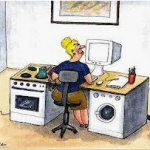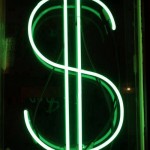Craig Thomas
Latest posts by Craig Thomas (see all)
- Chris Feels Victorious - September 8, 2016
- Are You At Risk of a Levy? - May 26, 2016
- 3 Ways To Survive Your Spouse’s Tax Troubles - February 15, 2016
There may be occasions where you might have to come out of your own pocket to foot the bill for business related items.
Here are 5 tax tips that you should know about this deduction.
1. Ordinary and Necessary
Generally, you can only deduct ‘unreimbursed’ expenses. To qualify for a deduction, expenses must be both ordinary and necessary for your line of work.
An ordinary expense, says the IRS, is one that is common and accepted in your trade or business. This means that what may be deductible for one business, may not be allowed for another.
A necessary expense is one that is helpful, and appropriate for your trade or business. An expense does not have to be indispensable to be considered necessary.
If you work in computer sales, I would strongly advise that you don’t gamble by claiming a day at the track as a ‘business deduction’.

If you do, you could end up talking to a tax auditor.
2. Business Expense Examples
Some costs that you may be able to deduct include:
- Supplies and tools you use on the job.
- Business use of your car.
- Business meals and entertainment.
- Business travel away from home.
- Business use of your home.
- Work-related education.
If your employer reimburses you for expenses incurred during your work efforts, there remains a chance for a deduction. The IRS provides special rules that clarifies the tax treatment for business expenses in the following publications:
- Publication 529 – Miscellaneous Deductions
- Publication 463 – Travel, Entertainment, Gift, & Car Expenses
3. Forms to Use
In most cases you report your expenses on Form 2106 or Form 2106-EZ. After you add up your allowable expenses, you then list the total on Schedule A as a miscellaneous deduction.
You can deduct the amount that is more than two percent of your adjusted gross income.
4. Educator Expenses
Basics: If you are a K through 12 teacher, and you paid for classroom supplies and other materials out of your own pocket, then you can claim those expenses as a tax deduction
Limits: You can claim up to $250 of classroom expenses for supplies, materials, books, software, and so forth. If both you and your spouse are educators, you can both may claim up to $250 of expenses, totaling $500 on your joint return. You claim this deduction as an adjustment on your tax return, rather than as an itemized deduction.
Any classroom expenses in excess of these limits can be deducted as an employee business expense, which is a miscellaneous itemized deduction subject to threshold of 2% of adjusted gross income.
The Educator Expense deduction is available through the year 2014.
5. Keep Records

If an examiner is chuckling at something on your return, you can be sure there will be questions! Be prepared to show exactly how your claimed deduction are ordinary for your occupation, and necessary for the operation of your business.







